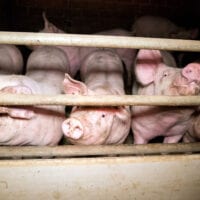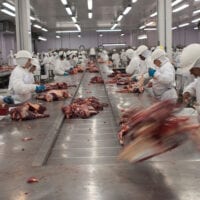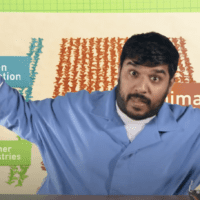Meat and dairy products have been a source of food for
millennia. But modern industrial farming practices and the sheer number
of animals involved is causing huge environmental damage, squeezing out
wild animals and accelerating climate change.
This rapid growth in meat and dairy production has been driven by profit-hungry companies and has led to drastic consequences for our planet. All these animals need a lot of food and vast areas of forests, grasslands and wetlands have been destroyed to feed livestock. Giant chunks of the Amazon rainforest and other South American forests and savannas have been replaced with fields of soya, wiping out the wildlife they support.
This is a disaster for the climate. Agriculture and deforestation contribute a quarter of global greenhouse gas emissions, and animal farming is responsible for 60% of the emissions from agriculture. These emissions come from a variety of sources. Converting forests and other landscapes into fields for animal feed releases greenhouse gases, and removes trees that help suck up and store carbon dioxide in the first place. Artificial fertilisers use a lot of energy to produce and they release another greenhouse gas – nitrous oxide – which traps much more heat than carbon dioxide. And cows produce a lot of methane – it’s no laughing matter that farts from billions of cows are warming our planet.
Common questions answered
Why is meat bad for the environment?
From climate change to forest fires to human rights abuses, the global industrial meat industry leaves a trail of destruction all over the world. And it’s not just red meat that’s the problem.
How can I eat less meat and dairy?
One of the most useful things everyone can do to take action on climate change *right now* is to eat less meat and dairy. Here are 10 tips to increase the amount of plant-based foods in your diet.
How much meat is ok to eat?
We need to end the system that’s churning out meat at an unsustainable rate – and in turn eat a lot less meat. Lots of people have already started. But if reduction is the key, how much meat is it ok to eat?
Chicken is often seen as a more environmentally friendly choice compared to beef, but global chicken consumption has almost doubled since 1990. Producing chicken at that scale comes with a host of problems – notably vast amounts of animal feed.
Animal agriculture is a really inefficient way to produce enough food for everyone on the planet. For every 100 calories of crops fed to animals, we get 40 calories in the form of milk, 12 calories of chicken, and just 3 calories of beef. Instead, that grain could be used to feed people directly and would help ensure everyone has enough food.
Industrial farming also comes with a host of other serious problems. Converting land for agriculture can disrupt water supplies and lead to soil erosion, while fertilisers escape the fields to pollute rivers and oceans. Animals in factory farms are kept in brutal conditions and bred to maximise meat production at the expense of their own welfare. And eating more meat and dairy is increasingly being linked to a host of health impacts such as obesity, diabetes and various cancers, jeopardising our own health.
There’s still time to stop the damage, but we need to radically change the way we think about food. The best advice comes from writer Michael Pollan: “Eat food. Not too much. Mostly plants.” As he suggests, we can eat less meat and dairy, not just as individuals but at a global level. To keep global temperature increases below 1.5ºC, we need to reduce the amount of meat and dairy we’re eating by more than half by 2030. That means big companies need to start producing tasty, healthy plant-based meals – and reduce the amount of meat and dairy products too. What meat we do eat has to be produced ecologically, respecting both the environmental impacts and the welfare of the animals themselves.
We also need to hold governments and companies accountable for the damage food production is causing and demand a more responsible approach. In this way, we can stop destroying forests to rear animals and grow crops to feed them. In 2006, Greenpeace pioneered a collective agreement between soya growers, traders and food companies to protect the Amazon from further destruction, which is still in place today.
A better attitude towards meat and dairy means we’ll be healthier, the animals we farm will be healthier, and our planet will be healthier.
A very interesting report, as usual from the wonderful people at Greenpeace! Always on target!
The blog song for today is: "over the hills and far away" by Led Zeppelin
TTFN







No comments:
Post a Comment